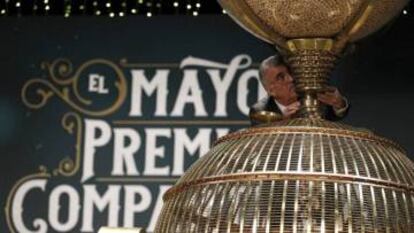The origin of Spain’s Christmas lottery: buying bullets to fight Napoleon
Popular ‘El Gordo’ draw was created in Cádiz in 1812 to raise funds to fight French troops
Spain’s famous Christmas lottery, known popularly as ‘El Gordo’ (The Fat One) spreads fortune and joy, and bolsters the state’s coffers, but originally it was conceived for something else: to buy bullets and make cannons to fight the French troops attacking the Andalusian city of Cádiz, which in 1812 was Spain´s last line of defense against the Napoleonic invasion.

Cádiz, which became the home of Spain´s government-in-exile in 1810, resorted to the lottery draw to cover the costs of the war against Napoleon’s troops, says Manuel Moreno Alonso, a professor of contemporary history at the University of Seville.
“It appears that it was Captain General of Cádiz, Gervasio Gasca who proposed to establish the lottery with the object of raising funds to alleviate the situation of displaced people and to reinforce the resistance,” explains Moreno.
It would be desirable to adopt more decent means than the lottery to sustain public necessities
Agustín de Argüelles, deputy
Although the special Christmas lottery did not exist at the time, the concept of national lotteries was not new. Evidence suggests that they already existed in the 18th century.
“There was already a lottery in 1809 in Seville, where the Spanish government, the Junta, was seated after Napoleon toppled Madrid,” said Moreno.
During the Spanish War of Independence, which began in 1808 and pitted Spain and its allies against the French, nearly all of Spain was under the control of the French empire. Napoleon’s brother, Joseph Bonaparte, was made king of Spain.
At that time, the lottery was just one more way to handle the high costs of the war, but it did have its naysayers “because it was always looked on as morally questionable, especially when it was in private hands,” says Moreno.

Moreno cites a speech given by Agustín de Argüelles, a deputy in the Spanish Congress, who said “it would be desirable to adopt more decent means than the lottery to sustain public necessities because the lottery, raffles and other games are resources that conspire with immorality and, as a consequence, are incompatible with the virtuous character that should be what distinguishes Spaniards in future.”
Despite the moral warnings, the need for cash won out. That’s why, in 1812, the government commissioned the production of 25,000 numbered wooden balls, to be handed in to authorities from December 15 to December 20, according to a document from the Historic Provincial Archives of Cádiz. Prior to this, according to the historical records, the winners of lotteries were not chosen with numbered balls, but instead with “rolled up documents” or papers that officials put in a sack and pulled out by hand.
The handcrafted balls were submitted, and Spain’s first national Christmas lottery took place on December 18, 1812. The lucky number was 03604 that first year, and the winners received 8,000 Spanish dollars (known as “reales de a ocho” in Spain) on an investment of 40 Spanish dollars.
Although the lottery was conceived of during the siege of Cádiz, by the time the lottery was celebrated the siege had already ended, having lasted from February 5, 1810 to August 25, 1812.
The war, however, was still raging, and the lottery spread from Andalusia to the rest of Spain as the Spanish troops defeated the French. In 1814, when the war was nearly over, the lottery headquarters moved from Cádiz to Madrid, and it has remained in the capital ever since.
Expats go crazy for the lottery
Spain's famous Christmas lottery, which takes place every year on December 22, is one of the most popular draws in the world. While Spanish people can be spotted lining up for hours to buy a lucky number, a recent study suggests that foreigners are even more enthusiastic.
The study, conducted by online lottery company Ventura24 using 2015 data, found that overall, foreigners tend to spend more money on the lottery than Spaniards. While the average Spaniard drops €50 on Christmas lottery tickets, the average foreigner spends €72, according to the study.
The study also found that in 2015, foreigners represented 20% of lotto ticket buyers. The biggest spenders were Mexicans (spending an average €153), followed by the Swiss (€87), Venezuelans (€73), Russians (€67), Germans (€65), the French (€62) and the Brits (€53).
English version by Alyssa McMurtry.
Tu suscripción se está usando en otro dispositivo
¿Quieres añadir otro usuario a tu suscripción?
Si continúas leyendo en este dispositivo, no se podrá leer en el otro.
FlechaTu suscripción se está usando en otro dispositivo y solo puedes acceder a EL PAÍS desde un dispositivo a la vez.
Si quieres compartir tu cuenta, cambia tu suscripción a la modalidad Premium, así podrás añadir otro usuario. Cada uno accederá con su propia cuenta de email, lo que os permitirá personalizar vuestra experiencia en EL PAÍS.
¿Tienes una suscripción de empresa? Accede aquí para contratar más cuentas.
En el caso de no saber quién está usando tu cuenta, te recomendamos cambiar tu contraseña aquí.
Si decides continuar compartiendo tu cuenta, este mensaje se mostrará en tu dispositivo y en el de la otra persona que está usando tu cuenta de forma indefinida, afectando a tu experiencia de lectura. Puedes consultar aquí los términos y condiciones de la suscripción digital.









































